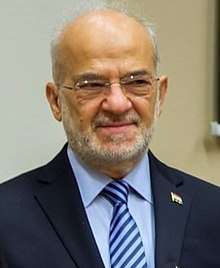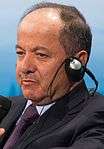December 2005 Iraqi parliamentary election
Following the ratification of the Constitution of Iraq on 15 October 2005, a general election was held on 15 December to elect a permanent 275-member Iraqi Council of Representatives.
| |||||||||||||||||||||||||||||||||||||
All 275 seats to the Council of Representatives of Iraq 138 seats were needed for a majority | |||||||||||||||||||||||||||||||||||||
|---|---|---|---|---|---|---|---|---|---|---|---|---|---|---|---|---|---|---|---|---|---|---|---|---|---|---|---|---|---|---|---|---|---|---|---|---|---|
| |||||||||||||||||||||||||||||||||||||
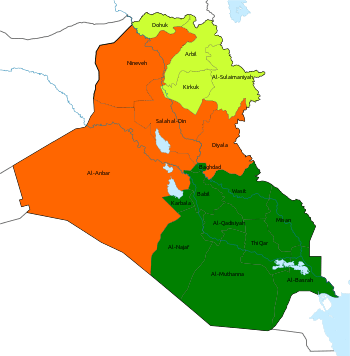 Colours denote which party won the most votes in every governorate | |||||||||||||||||||||||||||||||||||||
| |||||||||||||||||||||||||||||||||||||
The elections took place under a list system, whereby voters chose from a list of parties and coalitions. 230 seats were apportioned among Iraq's 18 governorates based on the number of registered voters in each as of the January 2005 elections, including 59 seats for Baghdad Governorate.[1] The seats within each governorate were allocated to lists through a system of Proportional Representation. An additional 45 "compensatory" seats were allocated to those parties whose percentage of the national vote total (including out of country votes) exceeds the percentage of the 275 total seats that they have been allocated. Women were required to occupy 25% of the 275 seats.[2]
The change in the voting system would give more weight to Arab Sunni voters, who make up most of the voters in several provinces. It was expected that these provinces would thus return mostly Sunni Arab representatives, after most Sunnis boycotted the last election.
Turnout was high (70%). The White House was encouraged by the relatively low levels of violence during polling,[3] with one insurgent group making good on a promised election day moratorium on attacks, even going so far as to guard the voters from attack.[4] President Bush frequently pointed to the election as a sign of progress in rebuilding Iraq. However, post-election violence threatened to plunge the nation into civil war, before the situation began to calm in 2007. The election results themselves produced a shaky coalition government headed by Nouri al-Maliki.
Full results
Final uncertified results were released by the Independent Electoral Commission of Iraq on Friday 20 January 2006. Certified results are expected to be released within two weeks, after the adjudication of any appeals and after lists have submitted the names of people who will take the seats.[5]
.svg.png) |
|---|
| This article is part of a series on the politics and government of Iraq |
|
|
| Constitution |
|
Government
|
|
Legislature |
|
Judiciary
|
|
|
|
| Alliances and parties | Votes | % | Seats | +/– | |
|---|---|---|---|---|---|
| United Iraqi Alliance | 5,021,137 | 41.2 | 128 | –12 | |
| Democratic Patriotic Alliance of Kurdistan | 2,642,172 | 21.7 | 53 | –22 | |
| Iraqi Accord Front | 1,840,216 | 15.1 | 44 | +44 | |
| Iraqi National List | 977,325 | 8.0 | 25 | –15 | |
| Iraqi National Dialogue Front | 499,963 | 4.1 | 11 | +11 | |
| Kurdistan Islamic Union1 | 157,688 | 1.3 | 5 | +5 | |
| The Upholders of the Message (Al-Risaliyun) | 145,028 | 1.2 | 2 | +2 | |
| Reconciliation and Liberation Bloc | 129,847 | 1.1 | 3 | +2 | |
| Turkmen Front | 87,993 | 0.7 | 1 | –2 | |
| Rafidain List | 47,263 | 0.4 | 1 | ±0 | |
| Mithal al-Alusi List | 32,245 | 0.3 | 1 | +1 | |
| Yazidi Movement for Reform and Progress | 21,908 | 0.2 | 1 | +1 | |
| National Independent Cadres and Elites | 0 | –3 | |||
| Islamic Action Organization In Iraq - Central Command | 0 | –2 | |||
| National Democratic Alliance | 0 | –1 | |||
| Total (turnout 79.6 %) | 12,396,631 | 275 | — | ||
1The KIU contested the previous election as part of the main Kurdish alliance.
| Party | District Seats | Compensatory Seats | Total |
|---|---|---|---|
| SCIRI & Badr Organization | 21 | 15 | 36 |
| Sadrist Movement | 27 | 2 | 29 |
| Islamic Virtue Party | 14 | 1 | 15 |
| Islamic Dawa Party | 13 | 0 | 13 |
| Islamic Dawa Party - Iraq Organisation | 12 | 0 | 12 |
| Independents and others | 24 | 1 | 25 |
| Total | 111 | 19 | 130 |
See also : Members of the 1st Iraqi Council of Representatives
New government
After six months of negotiations a "government of national unity" was agreed between the United Iraqi Alliance, Iraqi Accord Front, Kurdistani Alliance and Iraqi National List, under the leadership of Prime Minister Nouri al-Maliki.
Impact of election
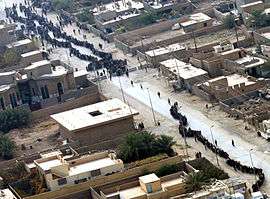
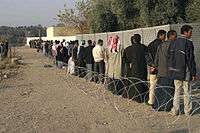
The election is expected to have a significant impact on the politics of Iraq. Most significant developments are expected to be:
Removal of coalition soldiers from Iraq
According to an opinion poll carried out for the British Ministry of Defence in August 2005 by Iraqi university researchers and leaked to the British press, 82 per cent of Iraqis are strongly opposed to the presence of US and other coalition troops and less than one per cent believe that the coalition troops are responsible for any improvement in security.[6]
Broadening of political space
This election will see the participation of two important groups - the Sunnis and the Sadrists - who did not participate significantly in the prior legislative elections. The domestic component of the insurgency has been linked to both groups.
Debate over Federalism and Secession
The elected Council of Representatives will have the difficult task of ratifying a constitution. The initial debate is likely to focus on the power of a centralized government versus a more localised power structure, in particular including policies surrounding oil and other natural resources, security and civil services.
Increased choice within communities
All three main communities will go into these elections with at least two significant coalitions to choose from. Parties have split from both the main Shi'a and Kurdish coalitions and two lists from the Sunni community are tipped to win significant support in that community.
Anti-incumbency vote
The main competition in the last election within the majority Shi'a community was between the secular outgoing Prime Minister, Iyad Allawi, and the United Iraqi Alliance which was backed by the religious authorities. This time the religious authorities have refused to back the Alliance and this may be influential in persuading some Shi'a to consider supporting Allawi. However, religious voters may prefer to vote for Sadr rather than casting their vote for Allawi, who is considered pro-American.
Averting a Civil War
Some predicted that if there was not a balance of representation between Sunnis and Shias, that the country was at risk of increased insurgency and perhaps civil war. The current insurgency, lacking the command and control infrastructure needed for large scale military operations, is not equipped to stage more than a haphazard guerrilla campaign. The withdrawal of 150,000 U.S. and British troops on the ground in Iraq, as desired by about 82 percent of Iraqis, is likely to remove motivation for internal Iraqi conflict, since only about one percent of Iraqis believe that the coalition troops are responsible for any improvements in security in Iraq.[6] According to an interview with Rajaa al-Bhayesh, a political scientist at Baghdad's Mustansiriya University, fear of wider civil conflict—beyond the likely continuation of violence by fringe groups like al Qaeda—is likely to promote the spirit of compromise.[7]
Parties and coalitions

The deadline for registering parties and coalitions closed on 28 October. The Electoral Commission announced that 228 lists had been registered, including 21 coalitions.
The emerging Iraqi political scene has been marked by groups of established parties running on joint lists, often grouped on sectarian or ethnic grounds. These lists are not necessarily stable, as the parties sharing a list may be past or present rivals; the situation will be even more complicated for the December 2005 election because parties can form different alliances in different governorates. The landscape is currently fluid; what follows is a list of some of the more important parties and coalitions, with a focus on alliances that have shifted since the January 2005 election.
United Iraqi Alliance (#555)
This coalition, dominated by Shi'ite parties, was formed to contest the January 2005 election with the blessing of Ayatollah Ali al-Sistani, the most senior Shi'ite cleric based in Iraq. It won the most votes in that election and became the senior partner in the coalition government that ran Iraq for most of 2005. The UIA's main components were:
- The Supreme Council for the Islamic Revolution in Iraq (SCIRI) led by Abdul Aziz al-Hakim and the transitional Deputy President Adel Abdul Mahdi
- The Islamic Dawa Party led by transitional Prime Minister Ibrahim al-Jaafari
- The Iraqi National Congress of Ahmed Chalabi
- The Islamic Virtue Party, which includes the Governor of Basra, Mohammed al-Waili
- Iraqi Hezbollah, led by former Iraqi Governing Council member Sheikh Abdel-Karim Mahoud al-Mohammedawi, who led the rebellion by the Marsh Arabs against Saddam Hussein.
- A number of independent politicians, including some supporters of Moqtada al-Sadr (although other Sadr supporters formed the National Independent Cadres and Elites party).
In advance of the December 2005 elections, Moqtada al-Sadr's party chose to join the Alliance. However, the Iraqi National Congress and Iraqi Hezbollah left the Alliance to form their own lists.
In a blow to the Alliance, Ayatollah Ali al-Sistani announced that he would not back any particular party for the election; he merely encouraged people to vote "according to their beliefs." He is said to have been disappointed with the performance of the transitional government.
It was initially reported before the election that the UIA seats would be split between the parties as follows:
- Supreme Council for the Islamic Revolution in Iraq (SCIRI) - 30 places
- Moqtada al-Sadr's party - 30 places
- Islamic Dawa Party - 29 places
- Islamic Virtue Party - 14 places
- others - 15 places
Analysis of the seat allocation after the elections showed that the 109 district seats and 19 compensatory seats won by the UIA were split as follows:
- Supreme Council for the Islamic Revolution in Iraq (SCIRI) and Badr - 21 + 15
- Moqtada al-Sadr's party - 25 + 3
- Islamic Virtue Party - 14 + 1
- Islamic Dawa Party - 13
- Islamic Dawa Party - Iraq Organisation - 12
- independents and others - 24
The Kurdistan Alliance (#730)
This Kurdish-dominated coalition was formed for the January 2005 election by the two main Kurdish parties—the Kurdistan Democratic Party of Kurdistan Region President Masoud Barzani and the Patriotic Union of Kurdistan of the transitional Iraqi President Jalal Talabani—plus some other smaller parties. The DPAK formed a coalition government with the UIA in the wake of the January 2005 elections.
This coalition will also contest the December elections, but the smaller Kurdistan Islamic Union, who won 10 percent of the seats in the Dahuk and Sulaymaniyah governorate elections in January, has announced that it will form its own governmental lists.
Iraqi National List (#731)
The Iraqi List was established by Iyad Allawi, who served as interim Prime Minister before the January 2005 election. It is dominated by his Iraqi National Accord party.
For the December 2005 election, it has joined forces with former interim President Ghazi al-Yawar's The Iraqis list, the People's Union list (which is dominated by the Iraqi Communist Party), and the Sunni Arab politician Adnan Pachachi and his Assembly of Independent Democrats to form a single list called the Iraqi National List. This list will attempt to present a secular and trans-community alternative to the other major lists, which are more based on the support of a single ethnic or religious groups.
Iraqi Accord Front (#618)
The Iraqi Islamic Party originally registered for the January elections but then decided to boycott the polls, which meant that it did not gain any seats. It has decided to participate in the December elections, forming a list called the Iraqi Accord Front with two other smaller parties, the Iraqi Peoples' Gathering and the Iraqi National Dialogue. These parties aim to tap the Sunni Arab vote; Sunni Arabs overwhelmingly boycotted the January election, but increased Sunni participation in the constitutional referendum may indicate an increased Sunni turnout for the December elections, especially because more than 1,000 Sunni clerics called on their followers to vote, according to the New York Times.[9] However, the Association of Muslim Scholars, which is influential in the Sunni community, has called for a boycott of the December elections, which could have an adverse impact on the Iraqi Accord Front's success.
Other lists
- National Peace List (#635) Led by Laith Kubba, the spokesman of the current Iraqi PM, Ibrahim Al-Jaafari
- Arabic List (#615)
- Independent Karbala Coalition (#533) - A Shi'ite group based in Karbala
- Brotherhood and Peace List (#737)
- National Congress Coalition (#569) - Made up of the Chalabi's Iraqi National Congress and some smaller groups including the monarchist Iraqi Constitutional Monarchy. Justice Minister Abdel Hussein Shandal has also joined this block. The list is mostly Shi'ite, but with some Sunnis.
- Al-Risaliyun (#631), “The Upholders of the Message” (or “Message Party” or “Progressives” in the IECI translation). This is a list of Sadrists that do not support the UIA and was backed by one of al-Sadr’s collaborators, sheikh Abdul-Hadi al-Darraji.
- Yazidi Movement for Reform and Progress (#668). Yazidi minority party.
- Islamic Coalition (#549)
- Justice and Future Coalition (#517)
- Al Nahrain National List (#752) - An Iraqi Christian list
- Al Wafaa For Basrah Gathering (#512)
- Iraqi National Dialogue Front (#667) - A mainly Sunni coalition, unlike the accord it is avowedly secular and opposed to the new constitution. It is led by Saleh al-Mutlak, who was a leader of Sunni opposition to the new constitution.
- Furation-Human Rights (#647)
- Mithal Al Aloosi List For Iraqi Nation (#620)
- Watanion Gathering (#814)
- Iraq Sun (#652)
- Al Khalas National Front (#798)
- Iraq Turkmen Front (#630)
- Unified National List (#829)
- Iraqi Free Progressive Party (#568). Its leader, Iraqi Sunni politician Mizhar Dulaimi was shot dead while campaigning in Ramadi on December 13. The previous night, he had appeared on television urging Sunnis to take part in the elections.
- Assembly of Independent Iraqis (#565) . A secular resistance-supporter list led by former electricity minister Dr. Ayham al-Samarie.
Fraud allegations
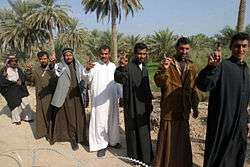
On December 22, 2005 Sunni Arab and secular Shiite factions demanded that an international body review election fraud complaints, and threatened to boycott the new legislature. The United Nations rejected the idea.
Large demonstrations broke out across Iraq on December 23, 2005 to denounce the parliamentary elections. Protesters said that the elections were rigged in favor of the main religious Shiite coalition. Many Iraqis outside the religious Shiite coalition allege that the elections were unfair to smaller Sunni Arab and secular Shiite groups. As many as 20,000 people demonstrated after noon prayers in southern Baghdad. Over 2,000 people demonstrated in Mosul, accusing Iran of involvement in the election.
Sheik Mahmoud al-Sumaidaei of the Association of Muslim Scholars, a major Sunni clerical group, told followers during prayers at Baghdad's Umm al-Qura mosque that they were "living a conspiracy built on lies and forgery."
Violence grew over the controversial election results. Car bombings and attacks on US and Iraqi officials continued after the elections. In Mosul Qusay Salahaddin, a Sunni Arab student leader was abducted and killed after leading a demonstration against the election results. Some 2,000 fellow students gathered at the mosque where Salahaddin's body was taken. Sunni's quickly accused militia forces loyal to one of the main parties in the Shiite Alliance bloc for Salahaddin's death. No group has yet claimed responsibility for the murder.[10]
References
- local election results Archived December 5, 2007, at the Wayback Machine
- BBC NEWS | Middle East | Guide to Iraq's election
- Iraqis flock to polls as insurgents urge Sunnis to vote | World news | The Guardian
- Iraqi Vote Draws Big Turnout Of Sunnis
- military bases international usb serial at ieciraq.org Archived 2006-01-25 at the Wayback Machine
- ZNet - Beyond the Ballot
- High Voter Turnout in Iraq Promises Fully Representative Parliament
- Informed Comment: January 2006
- https://www.nytimes.com/aponline/international/AP-Iraq.html?pagewanted=2
- At least 20 dead in Iraq violence - Conflict in Iraq- nbcnews.com
External links
| Wikiquote has quotations related to: Iraqi legislative election, 2005 |
- Uncertified results released January 20, 2006 (on the website of the Iraqi Election Commission)
- Election Law (from the Election Commission website
- Apportionment of 230 seats among the 18 Governorates
- Pakistan Daily Times
- Iraqi Election Commission Fact Sheet
- "The Hill Iraq's pre-election political landscape proves complex". Archived from the original on November 13, 2006. Retrieved December 16, 2005.
- "List of parties". Archived from the original on January 13, 2006. Retrieved December 16, 2005.
- Iraq the Model goes deep inside the Iraqi election
- An Average Iraqi look at the Possible Winners
- Iraqi Voters Choose First Permanent Constitutional Government
- Straw poll shows close race in Iraq
- Iraq takes another step down a long, hard road, The Economist, December 16, 2005
- "Sunni Leader Open to Coalition Government". Archived from the original on December 19, 2005. Retrieved December 17, 2005.CS1 maint: BOT: original-url status unknown (link)
- Shiites, Kurds Lead in Polls
- Christian slate wins narrow plurality in U.S. expat voting
